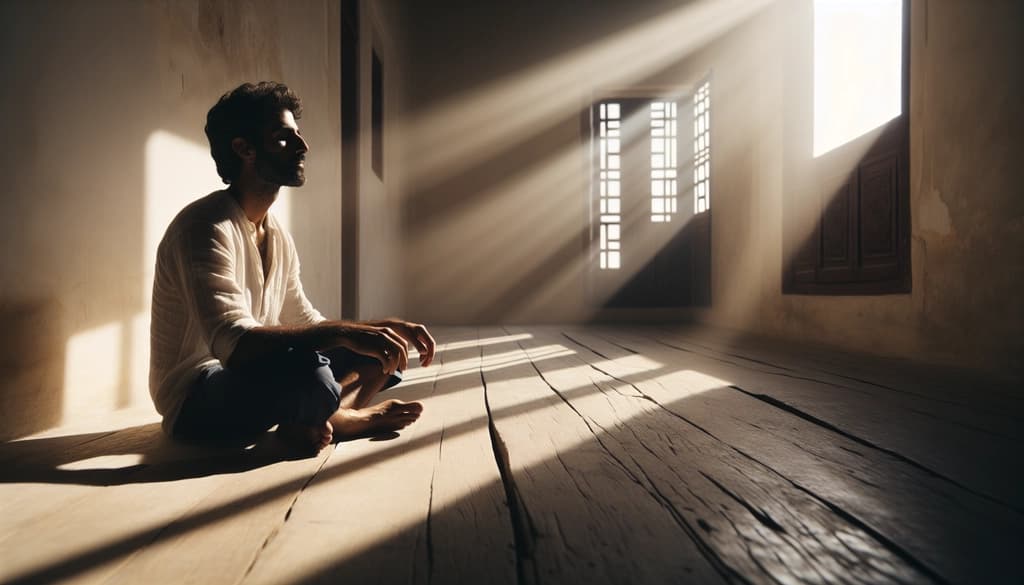Living from Awareness: What If Consciousness Is Home?

I used to believe that awareness was something I needed to reach for, like a better job or a reliable shelter. The phrase "living from awareness" hovered in spiritual books and teacher talks, sounding like a place I should already know how to inhabit—if only I tried harder, sat longer, or rejected the mess of my ordinary thoughts more fiercely.
When Groundlessness Feels Like Freefall
Sometimes I’d have moments—brief as a hush before a storm—where everything inside quieted, and awareness itself felt simple, almost tender. But then life would happen again. Money, deadlines, an argument, a memory flaring—and that background sense of being would vanish. I’d criticize myself: Why can’t I stabilize non-dual awareness, like all those serene faces on retreat posters?
Years ago, I remember waking up at 4am after a night full of anxious dreams. I padded to the kitchen, the world both too big and too fragile. There was a longing for the ground of being—a place that wouldn’t collapse beneath me. But all I had was hesitation and the thundering of my own heart. Could consciousness itself really be enough? Sometimes I wondered if I even understood what is consciousness, or if the concept was just something I’d read about and not actually felt.
Redefining Awareness: Not an Achievement, but an Allowing
What if living from awareness isn’t about forcing myself to stay in some rarefied state? What if there’s no trophy for perfectly stabilizing non-dual awareness? Lately, I’ve started to wonder if the whole problem is the part of me that tries to seize "awareness" like a goal, rather than letting myself rest in being—right in the middle of confusion or breathlessness.
Sometimes I think of consciousness as the deep river beneath all my daily stories. Even when I feel cut off or numb, something is still here, gently witnessing. That presence doesn’t judge or rush me. It waits, quietly available, no matter how many times I forget. As I began to explore the difference, it helped to consider awareness vs attention—realizing that awareness doesn’t grip or narrow, it simply allows.
You Don’t Have to Rest in Being All the Time
When someone tells you to "just rest in being," I wonder if they remember how threatening that can feel for a body or mind shaped by old survival patterns. It’s okay if it feels hard. Sometimes, the attempt to abide in naked awareness stirs old fear or grief. You don’t have to override the signals of your body to prove anything—or to be spiritual. Exploring non-duality explained helped me see that wholeness includes the part of me that resists too.
You might try this, if it feels right: let yourself notice the ordinary hum of consciousness right now—the feel of your feet, the rise of your next inhale. Maybe awareness is already here, not something to attain. If there’s a no in your body, trust it. Sometimes, honoring the no is itself an act of deep awareness. For many of us, realizing that you are not your thoughts can be a pivotal step—a softening in the grip of old stories, a return to inner space.
What the Research Can—and Can’t—Tell Us
There’s plenty of research about the benefits of meditation for stress, mood, and even brain structure. But science still struggles to explain the felt experience of resting in pure awareness—consciousness as the ground of being. The truth is, it’s intimate and uncanny, unique to each nervous system. You don’t need a scan to prove your experience is real. Sometimes, traditions such as advaita vedanta meaning speak to this mystery in their own language, offering a philosophical ground alongside your lived experience.
In Praise of Starting Again
Maybe living from awareness isn’t an endpoint or even a practice you can perfect. It’s a returning—sometimes every minute—to the sense that being itself is enough. Even if you fall out of awareness a hundred times today, you’re not failing. In those moments when I remember to step back and witness, I touch what some call the observer self concept—that unwavering presence behind all experience. May you know, in those scattered moments and sudden pauses, that you are always already home—even if you forget, even if you doubt.
